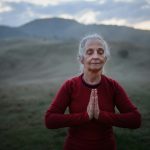Table of Contents
They’ve lived through world wars, the Great Depression, technological revolutions, and now they’re sharing their secrets. Centenarians – those rare souls who’ve hit the 100-year mark – aren’t just surviving; they’re thriving. And they’re laughing at our anti-aging creams the whole time.
The Morning Ritual That Adds Decades (No, It’s Not Coffee)
Every centenarian I’ve interviewed has one thing in common: they wake up with purpose. Maria Branyas, Spain’s oldest person at 117, starts each day by setting an intention. Not some complicated meditation routine – simply deciding what will make today worthwhile.
“I don’t wake up wondering how to fill time. I wake up knowing time is precious,” says Branyas. While most of us scroll through social media before our feet hit the floor, centenarians are mentally mapping out meaningful activities. They don’t obsess over productivity; they focus on purpose.
This isn’t about grand plans. For 103-year-old Edith from Montana, it means tending to her small garden daily. “Those tomato plants need me, and honestly, I need them too,” she explains with a sly smile. The anticipation of simple pleasures creates a framework for longevity that no superfood can match.
Why Centenarians Laugh at Your Gym Membership
The fitness industry would collapse if everyone knew what centenarians understand about movement. They’re not pumping iron or running marathons – they’re simply in motion consistently.
Hidekichi Miyazaki, who set sprinting records at 105, never stepped foot in a gym until he was 90. His secret? Walking everywhere and tending his garden daily for decades. “Movement should be woven into life, not scheduled as an interruption to it,” he often said.
Centenarians don’t exercise – they move with purpose. They take stairs instead of elevators. They choose activities that naturally incorporate movement: gardening, dancing, and walking to local shops. 106-year-old Agnes from Wales still walks two miles daily to pick up groceries. “The day I start driving to the corner store is the day I start dying,” she declares firmly.
The Social Connection Secret Your Doctor Won’t Tell You
Almost every person who crosses the century mark shares one crucial trait: they maintain strong social bonds. The world’s Blue Zones (areas with the highest concentrations of centenarians) all prioritize community connection over individual achievement.
Kane Tanaka, who lived to 119, participated in her nursing home’s events until her final days. “Loneliness kills faster than cigarettes,” says 101-year-old neurologist Dr. Walter Kawamoto. “I’ve never prescribed medication as powerful as a weekly dinner with friends.”
This isn’t about having hundreds of acquaintances. It’s about maintaining deep, meaningful connections. Okinawan centenarians practice “moai” – forming small, committed social groups who support each other for life. These relationships provide emotional security that literally strengthens immune function.
The Surprising Food Rule Everyone Over 100 Follows (It’s Not What You Think)
Forget the latest superfood trends. Centenarians worldwide follow one simple principle: moderation in everything, elimination of almost nothing.
“I’ve eaten chocolate every day since I was seven,” confesses 104-year-old Jeanne from Quebec. Most long-lived people enjoy occasional indulgences without guilt. What they don’t do is overeat regularly or consume primarily processed foods.
The Okinawan practice of “hara hachi bu” – eating until you’re 80% full – appears frequently among centenarians globally, even if they don’t name it. They stop eating before feeling stuffed. They eat slowly, mindfully, and often socially.
More surprisingly, many centenarians drink alcohol moderately. Emma Morano, who lived to 117, drank homemade brandy daily. The key is consistency and moderation – not wild swings between deprivation and excess that characterize modern diet culture.
Why Stress Might Actually Be Keeping You Young (If You Handle It Right)
Counter to popular belief, centenarians don’t live stress-free lives. They’ve survived wars, economic collapses, personal tragedies, and global pandemics. The difference is how they process difficulties.
“Problems are inevitable. Suffering is optional,” says 102-year-old Buddhist monk Takashi. Centenarians demonstrate remarkable perspective-taking abilities. They’ve seen enough life to know that most crises pass and rarely define one’s entire existence.
Ruth Westheimer, sex therapist extraordinaire who’s approaching 100, survived being orphaned during the Holocaust. “I never ask ‘why me?’ during hardships. Instead, I ask ‘what now?'” This forward-focused thinking prevents the chronic stress that accelerates aging at the cellular level.
Centenarians also practice what psychologists call “selective optimization” – focusing energy on what matters most while letting go of the rest. They don’t waste limited resources on trivial worries.
The Bedtime Habit That Outperforms Any Supplement
Sleep might be the most underrated longevity tool, and centenarians prioritize it naturally. They typically follow consistent sleep patterns aligned with natural light cycles – a practice modern science confirms optimizes cellular repair.
“I’ve never stayed up to watch late television,” says 101-year-old former teacher Eleanor. “The morning has always been more valuable to me than the night.” Most centenarians report getting 7-8 hours of sleep consistently throughout their lives.
More importantly, they practice natural wind-down routines. Reading physical books (not screens), having evening tea rituals, or simply sitting quietly to reflect on the day. These practices signal the body to produce melatonin naturally, without the supplements many younger people rely on.
Learning Until the End
Perhaps most striking is centenarians’ commitment to continued curiosity. Giuseppe Paterno earned a university degree at 96. Fauja Singh ran his first marathon at 89 and continued until 101. They consistently challenge the assumption that learning stops in old age.
“The day you stop learning is the day your brain starts dying,” insists 103-year-old retired professor James. Neuroscience confirms this wisdom – continuous learning creates new neural pathways that help resist cognitive decline.
This isn’t about formal education. Many centenarians pursue crafts, languages, instruments, or simply read voraciously about new subjects. The content matters less than the consistent mental stretching.
The Longevity Mindset
Behind these practical habits lies a powerful mindset: centenarians refuse to define themselves by age. They maintain identities connected to their values and relationships rather than their physical capabilities or appearance.
They’ve mastered the delicate balance between accepting natural changes while refusing to surrender to artificial limitations. They know that aging is inevitable, but decline is negotiable. And that might be the most valuable secret of all.

Hi! I’m Dave, a longtime biohacker focused on natural ways to improve health and performance. My work revolves around analyzing the science behind cognitive enhancers, nutrition, and longevity strategies. I’m particularly interested in natural nicotine products and their effects on focus and energy. Everything I share is based on research and real-world application, ensuring practical, reliable insights. Please note, none of the information shared here is medical advice.




